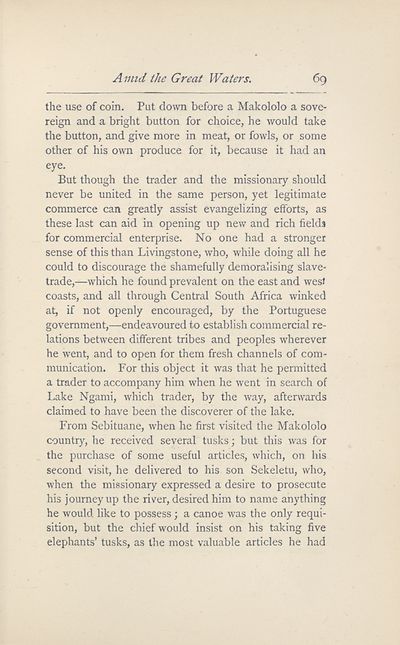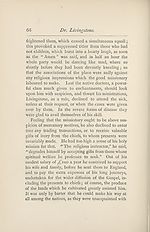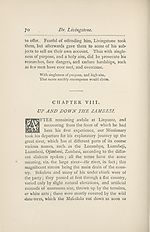Download files
Complete book:
Individual page:
Thumbnail gallery: Grid view | List view

Amid the Great Waters.
69
the use of coin. Put down before a Makololo a sove¬
reign and a bright button for choice, he would take
the button, and give more in meat, or fowls, or some
other of his own produce for it, because it had an
eye.
But though the trader and the missionary should
never be united in the same person, yet legitimate
commerce can greatly assist evangelizing efforts, as
these last can aid in opening up new and rich fields
for commercial enterprise. No one had a stronger
sense of this than Livingstone, who, while doing all he
could to discourage the shamefully demoralising slave-
trade,—which he found prevalent on the east and west
coasts, and all through Central South Africa winked
at, if not openly encouraged, by the Portuguese
government,—endeavoured to establish commercial re¬
lations between different tribes and peoples wherever
he went, and to open for them fresh channels of com¬
munication. For this object it was that he permitted
a trader to accompany him when he went in search of
Lake Ngami, which trader, by the way, afterwards
claimed to have been the discoverer of the lake.
From Sebituane, when he first visited the Makololo
country, he received several tusks; but this was for
the purchase of some useful articles, which, on his
second visit, he delivered to his son Sekeletu, who,
when the missionary expressed a desire to prosecute
his journey up the river, desired him to name anything
he would, like to possess; a canoe was the only requi¬
sition, but the chief would insist on his taking five
elephants’ tusks, as the most valuable articles he had
69
the use of coin. Put down before a Makololo a sove¬
reign and a bright button for choice, he would take
the button, and give more in meat, or fowls, or some
other of his own produce for it, because it had an
eye.
But though the trader and the missionary should
never be united in the same person, yet legitimate
commerce can greatly assist evangelizing efforts, as
these last can aid in opening up new and rich fields
for commercial enterprise. No one had a stronger
sense of this than Livingstone, who, while doing all he
could to discourage the shamefully demoralising slave-
trade,—which he found prevalent on the east and west
coasts, and all through Central South Africa winked
at, if not openly encouraged, by the Portuguese
government,—endeavoured to establish commercial re¬
lations between different tribes and peoples wherever
he went, and to open for them fresh channels of com¬
munication. For this object it was that he permitted
a trader to accompany him when he went in search of
Lake Ngami, which trader, by the way, afterwards
claimed to have been the discoverer of the lake.
From Sebituane, when he first visited the Makololo
country, he received several tusks; but this was for
the purchase of some useful articles, which, on his
second visit, he delivered to his son Sekeletu, who,
when the missionary expressed a desire to prosecute
his journey up the river, desired him to name anything
he would, like to possess; a canoe was the only requi¬
sition, but the chief would insist on his taking five
elephants’ tusks, as the most valuable articles he had
Set display mode to:
![]() Universal Viewer |
Universal Viewer | ![]() Mirador |
Large image | Transcription
Mirador |
Large image | Transcription
| Antiquarian books of Scotland > Religion & morality > David Livingstone > (85) |
|---|
| Permanent URL | https://digital.nls.uk/110311121 |
|---|
| Description | Thousands of printed books from the Antiquarian Books of Scotland collection which dates from 1641 to the 1980s. The collection consists of 14,800 books which were published in Scotland or have a Scottish connection, e.g. through the author, printer or owner. Subjects covered include sport, education, diseases, adventure, occupations, Jacobites, politics and religion. Among the 29 languages represented are English, Gaelic, Italian, French, Russian and Swedish. |
|---|

